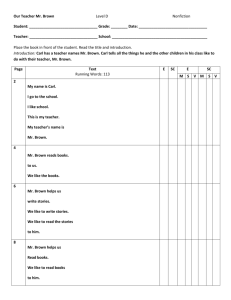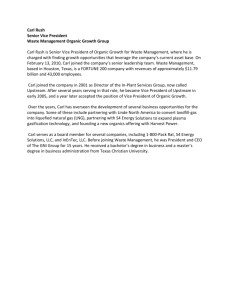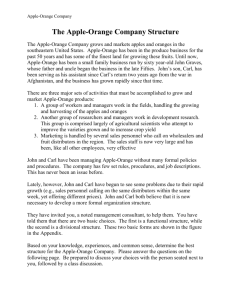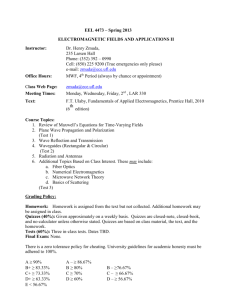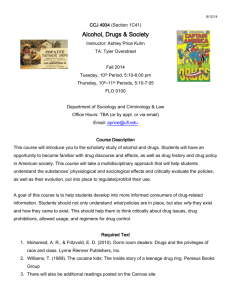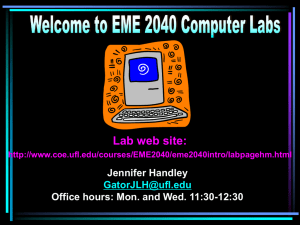Social problems
advertisement
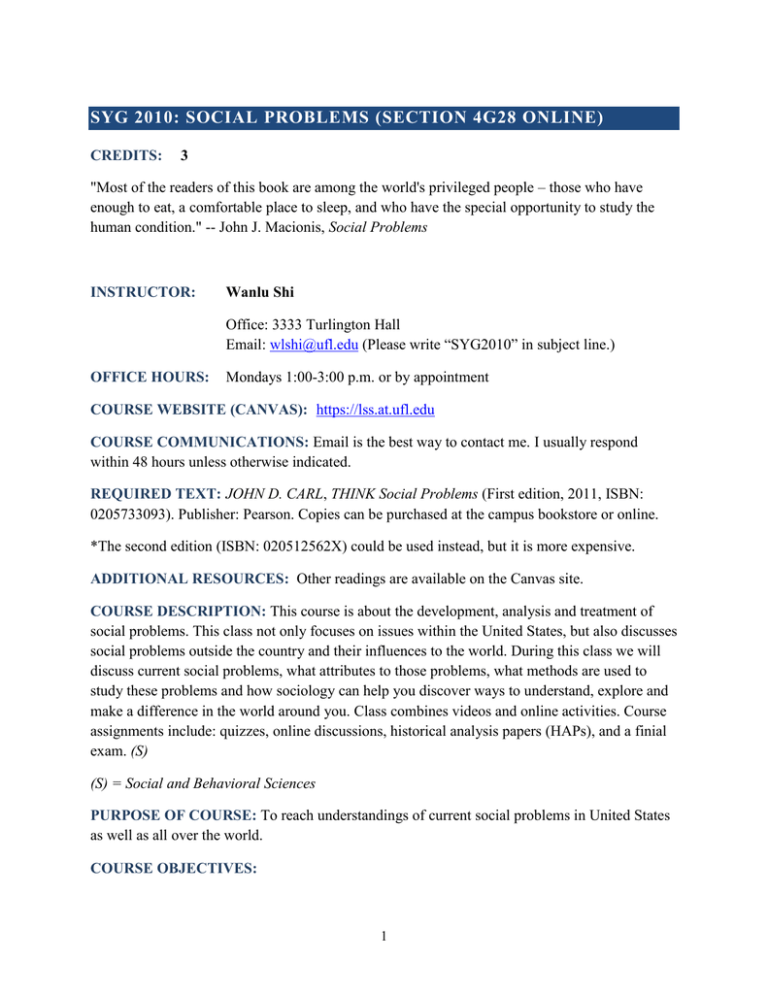
SYG 2010: SOCIAL PROBLEMS (SECTION 4G28 ONLINE) CREDITS: 3 "Most of the readers of this book are among the world's privileged people – those who have enough to eat, a comfortable place to sleep, and who have the special opportunity to study the human condition." -- John J. Macionis, Social Problems INSTRUCTOR: Wanlu Shi Office: 3333 Turlington Hall Email: wlshi@ufl.edu (Please write “SYG2010” in subject line.) OFFICE HOURS: Mondays 1:00-3:00 p.m. or by appointment COURSE WEBSITE (CANVAS): https://lss.at.ufl.edu COURSE COMMUNICATIONS: Email is the best way to contact me. I usually respond within 48 hours unless otherwise indicated. REQUIRED TEXT: JOHN D. CARL, THINK Social Problems (First edition, 2011, ISBN: 0205733093). Publisher: Pearson. Copies can be purchased at the campus bookstore or online. *The second edition (ISBN: 020512562X) could be used instead, but it is more expensive. ADDITIONAL RESOURCES: Other readings are available on the Canvas site. COURSE DESCRIPTION: This course is about the development, analysis and treatment of social problems. This class not only focuses on issues within the United States, but also discusses social problems outside the country and their influences to the world. During this class we will discuss current social problems, what attributes to those problems, what methods are used to study these problems and how sociology can help you discover ways to understand, explore and make a difference in the world around you. Class combines videos and online activities. Course assignments include: quizzes, online discussions, historical analysis papers (HAPs), and a finial exam. (S) (S) = Social and Behavioral Sciences PURPOSE OF COURSE: To reach understandings of current social problems in United States as well as all over the world. COURSE OBJECTIVES: 1 Identify essential elements and learn descriptive information about social problems. Examine how macro and micro level structures influence social issues from a sociological perspective. Identify and interpret the different approaches to studying social problems. Apply different sociological perspectives and use empirical data to construct the research evidence of the social problems. Be able to analyze social problems from a global perspective. Evaluate the credibility of the evidence supporting claims of social problems and the fit of a social policy intended to resolve a social problem. Evaluate the quality of institutions and NGOs based on their efficiency of problem solving. Effectively communicate in writing through discussions and assignments. TEACHING PHILOSOPHY: My philosophy of the teaching and learning experience is also an interactive one. This is your class rather than mine. I expect each of you to contribute to this learning experience through online activities. I will not be feeding you facts that you will then regurgitate. Instead, ideas will be presented and we will all challenge ourselves to think critically about these ideas by analyzing real-life examples. The format of this class includes videos and online discussions. I expect everyone to contribute to the teaching and learning experience in the next few months, so if you come across something outside of class that you think is relevant to what we have been discussing, please bring it to discussion forums and share with the rest of us or discuss it in your assignments. You are strongly recommended to participate in campus & community events related to the issues we discuss in class; I challenge you to step outside of your comfort zone as you think critically and innovatively to solve problems locally and around the world. INSTRUCTIONAL METHODS: This course is divided into modules on particular themes. You will need to review several online videos, complete the assigned reading (1-2 chapters) and review the associated ppt slides. When you have mastered the material for the module, you will be best able to complete the quiz and participate actively in the discussion forums. COURSE POLICIES 2 READING QUIZZES: You need to take a brief quiz on the readings for that module. Normally this will consist of ten questions. The quizzes will focus on the main points of each reading rather than minor details. Quizzes must be completed within 15 minutes. You will only have one attempt to each quiz. Quizzes must be completed by the evening (11:55 pm) of the day in which they are due. Make-up quizzes will not be given. ONLINE DISCUSSIONS: You will find 1-2 questions (in each module) that should be answered and discussed. The discussion involves writing at minimum 200 words for your own post to the board (see discussion rubric). Discussion forums must be completed by the evening (11:55 pm) of the day in which they are due. You are also required to provide peer reviews to three other students’ posts (will be assigned automatically after each discussion’s due date). Peer reviews should be completed within two days after they have assigned to you. Incompletion of peer reviews will lead to at least two points off. HISTORICAL ANALYSIS PAPERS: You are required to submit 3 historical analysis papers (HAPs) throughout the semester. Each of the 3 HAPs has a deadline and need to be submitted on Canvas no later than the due, or you will receive a 0 (zero) for each analysis paper that is missed. FINAL EXAM: There is a cumulative final exam. You are required to complete a 50 question final exam on Canvas. The final exam must be completed within 90 minutes. The exam will be available during the last module and must be completed between August 6-7. SPECIFIC DATES FOR TERM PROJECT AND EXAMS APPEAR BELOW. UF POLICIES UNIVERSITY POLICY ON ACCOMMODATING STUDENTS WITH DISABILITIES: Students requesting accommodation for disabilities must first register with the Dean of Students Office (http://www.dso.ufl.edu/drc/). The Dean of Students Office will provide documentation to the student who must then provide this documentation to the instructor when requesting accommodation. You must submit this documentation prior to submitting assignments or taking the quizzes or exams. Accommodations are not retroactive, therefore, students should contact the office as soon as possible in the term for which they are seeking accommodations. UNIVERSITY POLICY ON ACADEMIC MISCONDUCT: Academic honesty and integrity are fundamental values of the University community. Students should be sure that they understand the UF Student Honor Code at http://www.dso.ufl.edu/students.php. 3 GETTING HELP For issues with technical difficulties for E-learning in Canvas, please contact the UF Help Desk at: ● Learning-support@ufl.edu ● (352) 392-HELP - select option 2 ● https://lss.at.ufl.edu/help.shtml Any requests for make-ups due to technical issues MUST be accompanied by the ticket number received from LSS when the problem was reported to them. The ticket number will document the time and date of the problem. You MUST e-mail your instructor within 24 hours of the technical difficulty if you wish to request a make-up. Other resources are available at http://www.distance.ufl.edu/getting-help for: Counseling and Wellness resources Disability resources Resources for handling student concerns and complaints Library Help Desk support Should you have any complaints with your experience in this course please visit http://www.distance.ufl.edu/student-complaints to submit a complaint. GRADING POLICIES Assignment Points or percentage Quizzes 20% Online Discussions 30% 3 Historical Analysis Papers 30% Final exam 20% GRADING SCALE: Letter grades will be determined by the following: 4 Grade Grade Scale Grade Points A 92100 A9091 B+ 8889 B 8288 B8081 C+ 7879 C 7277 C7071 D+ 6869 D 6267 D6061 E,I,NG,WF 4.0 3.67 3.33 3.0 2.67 2.33 2.0 1.67 1.33 1.0 0.67 0 0-59 For more information, see: http://www.isis.ufl.edu/minusgrades.html COURSE SCHEDULE SOCIAL PROBLEMS MODULE 1: INTRODUCTION & COURSE OVERVIEW 06/29-07/01 C. Wright Mills - "The Promise" The Sociological Imagination MODULE 2: THEORY & METHODS 07/02-07/05 Chapter 1 - Carl. 2011. Think: Social Problems MODULE 3: SOCIAL INEQUALITY AND POVERTY 07/06-07/08 Chapter 2 - Carl. 2011. Think: Social Problems MODULE 4: RACE, ETHNICITY, AND IMMIGRATION 07/09-07/12 Chapter 3 - Carl. 2011. Think: Social Problems MODULE 5: GENDER AND SEXUALITY 07/13-07/15 Chapter 4 - Carl. 2011. Think: Social Problems Chapter 11 - Carl. 2011. Think: Social Problems MODULE 6: MARRIAGE AND FAMILY 07/16-07/19 Chapter 15 - Carl. 2011. Think: Social Problems HAP 1 due on 07/19 (before 11:55 pm) MODULE 7: EDUCATION 07/20-07/22 Chapter 8 - Carl. 2011. Think: Social Problems MODULE 8: HEALTH, AGING, AND DISABILITIES 07/23-07/26 Chapter 9 (Physical Health Part) - Carl. 2011. Think: Social Problems Chapter 5 - Carl. 2011. Think: Social Problems MODULE 9: ALCOHOL, DRUGS, AND MENTAL HEALTH 07/27-07/29 Chapter 10 - Carl. 2011. Think: Social Problems 5 Chapter 9 (Mental Health Part) - Carl. 2011. Think: Social Problems HAP 2 due on 07/29 (before 11:55 pm) MODULE 10: ENVIORNMENT, RESOURCE, AND ENERGY 07/30-08/02 Chapter 19 - Carl. 2011. Think: Social Problems MODULE 11: POPULATION 08/03-08/05 Chapter 18 - Carl. 2011. Think: Social Problems MODULE 12: FINAL EXAM 08/06-08/07 To be completed between August 6-7 HAP 3 due on 08/07 (before 11:55 pm) Disclaimer: I reserve the right for me to make changes to this syllabus, so long as they are announced in advance on Canvas or by email. 6
